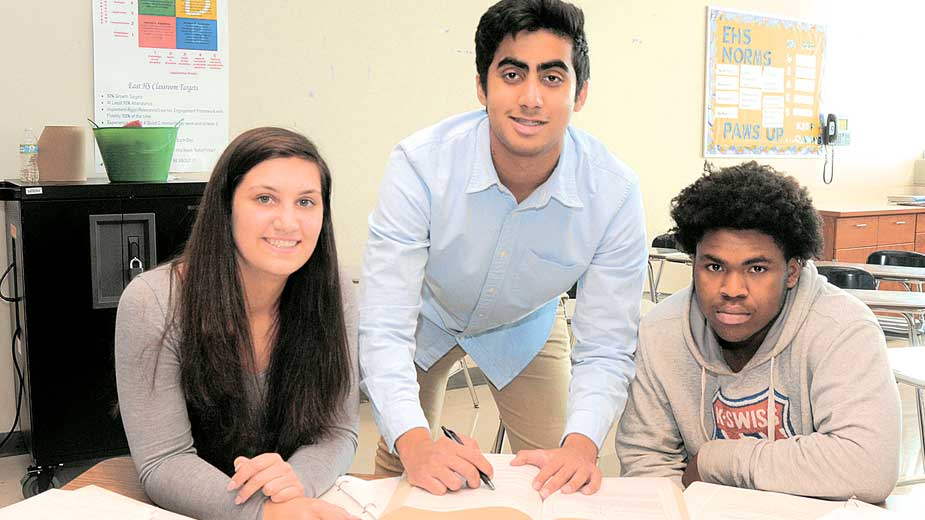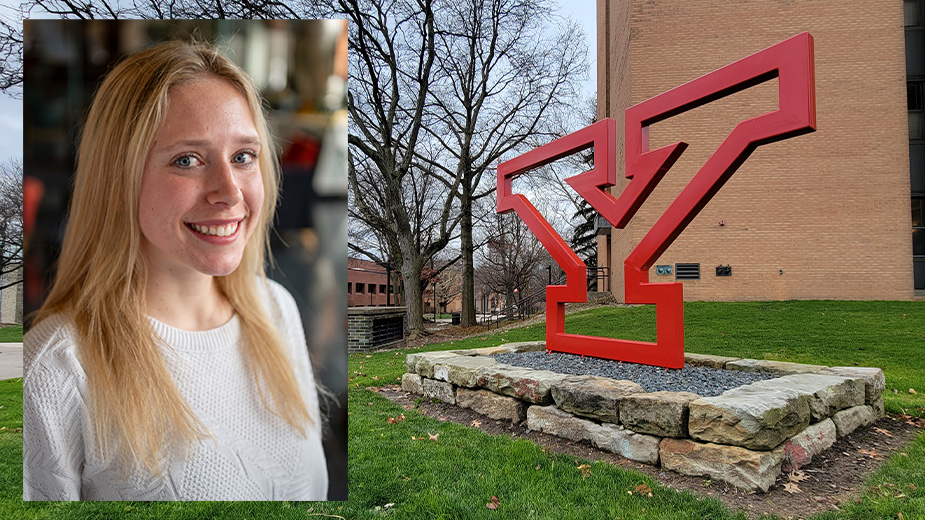Brain Gain is Canfield Teenager’s Business
YOUNGSTOWN, Ohio — Marquan Herron feels no pressure when he’s on the football field.
Put a test such as the ACT in front of the Chaney High School student, though, and he freezes. “I’m not a good test taker,” says the soft-spoken senior. “It’s way more pressure than catching a football.”
Herron is a star wide receiver for Chaney, which sees about half of its students go to college.
Herron wants to get more scholarship offers from Division I colleges. He has two offers so far – from Bowling Green State University and Kent State University.
“The better my ACT score is, it will help me get into more colleges,” Herron says. “I’m definitely looking for help to boost my score and get more looks.”
That’s where Prabh Dhaliwal comes in. He is the subject of the first profile in The Business Journal’s new recurring series “Young Minds/Big Dreams.” The 16-year-old Canfield senior and young entrepreneur started his own business his junior year of high school. Aspiration Prep is a 501(c)3 tax-exempt nonprofit organization that provides free ACT and SAT tutoring services.
Several test-prep companies exist in the country, but the uniqueness of Aspiration Prep is that it’s taught by volunteers – students who have recently taken the test and scored well – and it’s free.
Dhaliwal says that adults, who haven’t taken the tests in some time, teach at many of the test-prep companies. “Our instructors – students – have put in the work, figured out the tests and now want to share their knowledge with others,” he says.
Offering the service for free is paramount for Dhaliwal. He founded the company as a nonprofit “not to make money but to make the biggest impact, raise as much money as possible to impact as many individuals as possible, and create the biggest brand possible. That is the goal of the company,” he says.
So far Aspiration Prep has affected 1,200 students, either through in-person or online instruction, Dhaliwal says. His motivation is to help other students succeed – whether it’s improving test scores for college-bound students or for people who want to pursue trade and technical schools.
“It’s basically for any student with aspirations and dreams to make a living and have an opportunity for themselves,” Dhaliwal says. “Standard testing isn’t just constrained to college. It opens doors in other fields as well.”
Chaney principal Rob Kearns agrees, knowing that many of his students need the opportunity to succeed in a variety of career paths.
Kearns heard of Dhaliwal’s work and sought the opportunity for his students.

“Students are getting it from other high school students who have done the ACT test well,” Kearns says. “They are going through the exact same things. Our kids are getting ready for homecoming and so are they. They can make those connections that adults who are too far removed from taking the test don’t have.”
One of the biggest benefits for Kearns is that the classes are free. Chaney has 700 students enrolled with a poverty rate at 100%.
“I was hoping to get our kids access to these classes because they can’t always get it on their own. It is very, very expensive,” Kearns says.
It’s also expensive to take the ACT exam with a price tag of $52 to $68 per test. The state covers the cost for a student to take the test as juniors and seniors; after that, students must pay. While there is some assistance with costs, additional fees exist.
The exam consists of four multiple-choice tests: English, reading, mathematics and science. It is offered seven times a year. Students are able to take the test 12 times
Dhaliwal also teaches his test-prep classes at East High School. He believes affluent school districts like Canfield offer more information on how standardized test scores can help get students involved in all sorts of educational endeavors leading to successful careers.But that doesn’t always happen in less-privileged school districts.
“There is an information divide, and that’s what initially motivated me to try to fill that divide and help kids prepare,” Dhaliwal says. “I’m motivated to first spread the word on what tests can do for you and also to help them to prepare.”
For student athletes such as Herron, it can be about getting more scholarship offers.
“Every student has a different goal and mine is to help them either hit or surpass that goal,” Dhaliwal says. “For some, their goal is athletic recruitment by bumping up their scores to NCAA cutoffs. My goal is to help them hit those goals because there are many talented athletes that can go to D-I [Division I] schools. They just need to get their scores up for that extra layer.”
Division I colleges use a sliding scale to match ACT scores and core-course grade-point averages to increase eligibility opportunities.
Herron, who has a 3.3 GPA, believes the test-prep classes are helping.
“I thought it would be boring,” he says. “I didn’t think I’d enjoy it as much but it’s educational. It helps. I mean it’s a little boring, but it’s educational and helps a lot to prepare us.”
But as with any goal, Dhaliwal says work needs to be put in to achieve success. He suggests that students find 30 to 40 minutes a day to prepare for taking the test.
That preparation has paid off for all of the company’s high-achieving instructors.
Dhaliwal says he chooses student instructors who have scored at least in the 90th percentiles of the test. Dhaliwal is in the 99th percentile, scoring a 35 out of 36 on the ACT.
Ben Janik, 17, Joe Scolieri, 17, both of Canfield and Ashlim Pabindrn, 16, of Poland are instructors for the Aspiration Prep classes at Chaney and East High. All three also have scored between the 95th to 99th percentile.
Instructors are not paid; rather, they volunteer their services. They receive credit for volunteer-service requirements, National Honor Society and other recognition programs that can enhance their resumes to enter college.
Students who have taken his company’s prep classes increase their ACT point scores by an average of two to four points, according to Dhaliwal.
That is Herron’s hope. He scored an 17 on his first attempt. The average ACT test score in Ohio in 2018 was 20.3.
The Chaney football coach, Chris Amill, heard about the class and told some of the players they should attend. Students who want to play sports at Chaney must have at least a 2.5 GPA. The class is open to all Chaney students.
Herron’s parents talked to him about going to college, but have never pushed him toward a pathway, he says.
He knows a football scholarship is one way to get a college education. He also takes a class at Choffin Career and Technical Center. His face lights up when he talks about wanting to study video-game design.
“I’m high scoring in that,” he says with a smile. “I just like sitting down at the computer. It’s great with 3D models and watching it all come through the process. It’s real fun when I’m at the computer animating it.”
Like Herron, Dhaliwal’s face lights up when he shares a success story – for instance, a fellow Canfield student who wanted to improve her ACT math score. “One of my peers at Canfield went from 28 to 36. An eight-point increase is almost unheard of in the world of ACT prep. That’s a big success story that I’m super proud of,” he says.
Dhaliwal completed an internship at the Youngstown Business Incubator the summer after his junior year. He learned about resources and funding possibilities to get his company started.
He set out to secure startup money. He privately tutored students – especially in math – reached out to some local organizations and sought out private donors to raise the $5,000 he needed.
Three Canfield teachers – principal Michael Moldovan, guidance counselor Rebecca Heikkinen and English and language teacher Michael Ruark – were also instrumental in mentoring him.
Dhaliwal is a precocious young man mature beyond his 16 years. He says his parents supported his venture as long as he didn’t stray from his obligations and his grades didn’t suffer. He is applying for admission to several top colleges.
Dhaliwal has continued to raise funds through the Youngstown and Canfield Rotary clubs and Rotary International, which pays for materials to teach the classes, some legal fees and website maintenance.
Aspiration Prep is now offered in nine states and has 25 instructors. He maintains weekly contact with the out-of-state instructors.
Dhaliwal wants to pursue a degree in business and social impact. He believes that merging business and social impact can create change and also make a profit.
His immediate business goal – other than to share his passion for education – is to have his company operating in all 50 states.
Meeting students at their ability range has affected Dhaliwal: “That’s one big take away I’ve had from this journey.”
For Herron, his takeaway is that if he doesn’t have a future in football, he still wants to get a college education.
For more information on Aspiration Prep, visit AspirationPrep.com.
The Business Journal thanks our partner sponsors

Copyright 2024 The Business Journal, Youngstown, Ohio.


